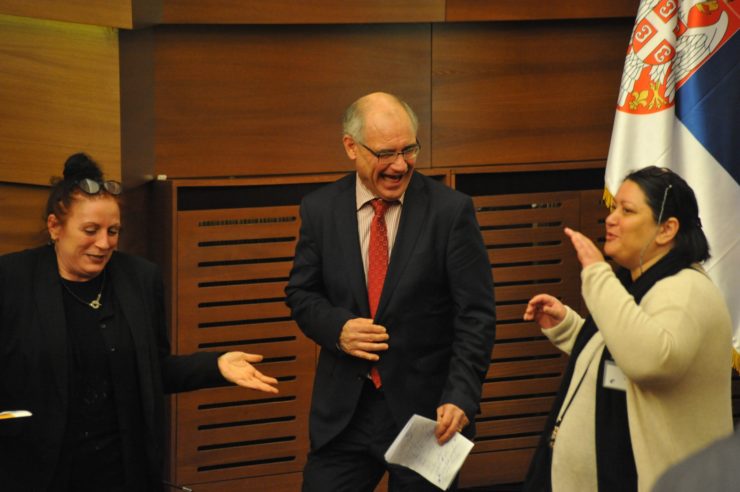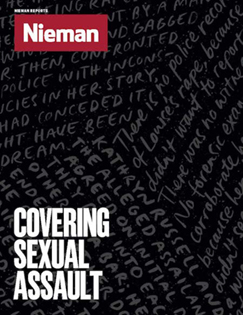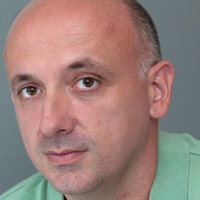
Dragana Matović with Rudolf Elmer and Bojana Bokorov at the "For Every Truth There is a Source" conference
Whistleblowers from Serbia, Bosnia, Switzerland, and the Netherlands had just shared intensely emotional stories with an international audience of journalists, activists, prosecutors, and judges. We almost lost English translation to the tears of the interpreter as a whistleblower explained how she had received death threats and how her being under police protection affected her two small children.
As the shocked audience was still discussing what had been said at the panel, an upbeat Serbian whistleblower approached me and said: “Now I know I’m not crazy. You see these things happen all over the world.”
This is what we were hoping would happen.
Pištaljka (“The Whistle”), the investigative journalism website my wife, Dragana Matović, and I founded six years ago in Belgrade is devoted to whistleblowing and whistleblower protection. The focus on whistleblowing was natural for us, as we were fired from a government-controlled newspaper after blowing the whistle on censorship and conflict of interest. Our effort over the past few years not only led to some high-profile investigations and court cases, but more importantly contributed to Serbia adopting a whistleblower protection law and successfully implementing it. One American expert even describes it as the “gold standard” for whistleblower protection.
Now, Pištaljka was hosting its first international conference on the protection of whistleblowers and journalistic sources named “For Every Truth There Is a Source.” The conference, held on October 27 and 28, gathered dozens of whistleblowers, journalists, judges, lawyers, and activists from Serbia, Switzerland, Germany, the Netherlands, Bosnia, Italy, Montenegro, the U.S., and the UK for in-depth discussions and trainings.
We knew this type of event was much needed. Whistleblowers from different countries rarely get a chance to talk to each other or to journalists, to share experiences, receive support, and possibly come up with solutions. Aside from the elation that at least one Serbian whistleblower felt upon realizing he was not alone (and crazy), the main takeaway from the conference is that we also need more discussions between whistleblowers and journalists. Most whistleblowers from Western Europe at the conference said they distrusted the media and complained that media in their countries are closed to them and their stories. One of these whistleblowers, the Swiss ex-banker Rudolf Elmer, found an alternative by approaching WikiLeaks, while British whistleblower Eileen Chubb created an alternative whistleblowing website The Whistler together with the now deceased investigative journalist Gavin MacFadyen. On the other hand, LuxLeaks whistleblower Antoine Deltour, speaking via Skype, said he received full support from the French investigative journalist Edouard Perrin. (Both Deltour and Perrin were charged by the Luxembourg authorities; Perrin has since been acquitted.)
Another first happened in Belgrade in October: a prime minister opened a whistleblowing conference. In his speech, Serbian Prime Minister Aleksandar Vučić praised Pištaljka and its work with whistleblowers (although, he said, he did not agree with some stories we published). He stayed on to listen to speech by Serbian whistleblower Borko Josifovski.
Josifovski was fired as head of Belgrade medical emergency service 10 years ago after blowing the whistle on collusion between doctors and funeral homes—apparently doctors were getting paid to provide funeral homes with addresses and phone numbers of bereaved families. Ever since, he has been trying to prove he was right and that some critically ill patients were even denied proper care because physicians were after money. A recent investigation by Pištaljka revealed that prosecutors never fully investigated Josifovski’s claims. One family even said that a funeral home had phoned them minutes after the death of their family member.
Josifovski closed his address by saying that with the help of Pištaljka he’s using the new whistleblower law to sue the goverment of Serbia for inaction in investigating his claims and for retaliation against him. The doctor’s speech was met with loud applause. In the first row, the prime minister was clapping his hands, too.



